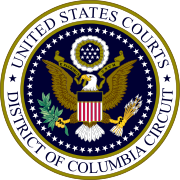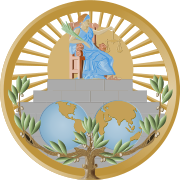User:WillowCity/sandbox
Kameny v. Brucker[edit]
| Kameny v. Brucker | |
|---|---|
 | |
| Court | United States Court of Appeals for the District of Columbia Circuit |
| Full case name | Franklin Edward Kameny v. Wilber M. Brucker, Secretary of the Army, et al. |
| Decided | June 23, 1960 |
| Case history | |
| Appealed from | United States District Court for the District of Columbia |
| Appealed to | United States Supreme Court (Petition for Certiorari denied) |
| Case opinions | |
| Per curiam: the District Court's summary dismissal of Kameny's suit was affirmed, and his termination was found both substantively and procedurally valid. | |
Kameny v. Brucker () is a decision of the United States Court of Appeals for the D.C. Circuit, upholding the dismissal of a federal public servant on the basis of alleged "immoral conduct".[1] Although the case received little attention at the time, subsequent legal commentators and activists have commented on its implications, including its influence in shaping future legal arguments rooted in the Equal Protection Clause.[2][3]
Background[edit]
Historical context[edit]
Following the end of World War II and the onset of the Cold War, the government of the United States adopted an increasingly hardline approach to perceived security threats and internal "subversion". This included a systematic purge of homosexual employees from the federal public service, a phenomenon referred to as the "Lavender Scare".
Frank Kameny[edit]
Kameny
Court proceedings[edit]
The
Aftermath[edit]
In Griswold v. Connecticut, the Supreme Court recognized a right to privacy under the Fourteenth Amendment to the United States Constitution. However, Griswold did not extend protection to same-sex relationships; in Bowers v. Hardwick, the Court specifically upheld a Georgia sodomy law criminalizing consensual same-sex activity between adults.
The holding in Bowers v. Hardwick was overturned in Lawrence v. Texas, with the Court striking down a Texas sodomy law as violating the Due Process Clause of the Fourteenth Amendment. Lawrence rendered such laws unconstitutional nationally.
In 2020, the Supreme Court released its decision in Bostock v. Clayton County, determining that employment discrimination on the basis of sexual orientation and gender identity are prohibited by Title VII of the Civil Rights Act of 1964. Under Bostock, Kameny's dismissal would likely be found to violate Title VII.
References[edit]
- ^ "Franklin Edward Kameny, Appellant, v. Wilber M. Brucker, Secretary of the Army, et al., Appellees, 282 F.2d 823 (D.C. Cir. 1960)". Justia Law. Retrieved 2023-10-04.
- ^ Hunter, Nan D. (1993). "Identity, Speech, and Equality". Virginia Law Review. 79 (7): 1695–1719. doi:10.2307/1073384. ISSN 0042-6601.
- ^ Eskridge Jr., William N. (February 12, 2002). "January 27, 1961: The Birth of Gaylegal Equality Arguments" (PDF). N.Y.U. Annual Survey of American Law. 58: 39, 48.
Supreme Court of Canada Labour Trilogies[edit]
The Labour Trilogies refer to several Supreme Court of Canada decisions interpreting section 2(d) of the Canadian Charter of Rights and Freedoms in the context of labour relations. The interpretation of section 2(d) underwent significant evolution between 1987 and 2015, and its precise scope and extent was vigorously contested during this era. While the SCC in 1987 viewed freedom of association as an individual right, which did not protect collective bargaining or a right to strike, this position was subsequently revised. In 2015, the SCC specifically overruled the 1987 "Trilogy" and recognized a constitutionally-protected right to strike.
Background[edit]
Section 2 of the Canadian Charter of Rights and Freedoms entered into force in 1982.
The 1987 Trilogy[edit]
On April 9, 1987, the Court released its decisions in PSAC v. Canada, Reference Re Public Service Employee Relations Act (Alta), and RWDSU v. Saskatchewan.
The 2001-2002 Trilogy[edit]
In 2001, the SCC decided R v. Advance Cutting & Coring Ltd, Dunmore v. Ontario (AG); its decision in R.W.D.S.U. v. Pepsi-Cola was released in 2002.
The 2015 Trilogy[edit]
The SCC decisions in Saskatchewan Federation of Labour v. Saskatchewan, Mounted Police Association of Ontario v. Canada (Attorney General), and Meredith v. Canada (Attorney General) represented a significant expansion of the scope of section 2(d).
South Africa v. Israel[edit]
| South Africa v. Israel | |
|---|---|
 | |
| Court | International Court of Justice |
| Full case name | Application instituting proceedings and request for the indication of provisional measures |
The Institution of proceedings against the State of Israel and request to indicate provisional measures is an application pending before the International Court of Justice. Filed by South Africa, the application alleges that Israel is committing genocide against Palestinians in the Gaza Strip. Arising from Israel's conduct of the 2023 Israel–Hamas war, the application alleges that Israel's military campaign in Gaza has been carried out "with the intent to destroy Palestinians in Gaza". Israel has rejected South Africa's allegations "with disgust", describing the case against it as "blood libel".
ICJ application[edit]
South Africa instituted the proceedings under the Genocide Convention, to which both Israel and South Africa are signatory.[1][2][3] South Africa's application was brought pursuant to Article IX of the Convention.[2]
In an 84-page application filed on 29 December 2023, South Africa alleged that Israel's actions "are genocidal in character because they are intended to bring about the destruction of a substantial part of the Palestinian national, racial and ethnical group."[2][4] South Africa requested that the ICJ issue a binding legal order on an interim basis (i.e., prior to a hearing on the merits of the application), requiring Israel to "immediately suspend its military operations in and against Gaza."[2][4] While adjudication of the merits of the case may take years, such an order could be issued within weeks.[3]
Balkees Jarrah, associate international justice director at Human Rights Watch, notes that the ICJ case is not a prosecution of individuals, and does not directly involve the International Criminal Court, which is a separate body.[3] Jarrah stated that the case presents an opportunity to "provide clear, definitive answers on the question of whether Israel is committing genocide against the Palestinian people."[3]
Israeli response[edit]
Israel rejected the allegations "with disgust"[3] and accused South Africa of working with Hamas,[1] describing the actions of South Africa as "blood libel".[5] On 2 January 2024, Israel decided to appear before the ICJ in response to South Africa's application, despite a prior history of ignoring international tribunals.[4]
References[edit]
- ^ a b Chao-Fong, Léonie; Belam, Martin; Ahmad, Reged; Belam, Léonie Chao-Fong (now); Martin; Ahmad (earlier), Reged (2023-12-29). "Israel-Gaza war live: Israel hits back at South Africa after it launches genocide case at UN's top court". the Guardian. ISSN 0261-3077. Retrieved 2023-12-29.
{{cite news}}: CS1 maint: multiple names: authors list (link) - ^ a b c d "Proceedings instituted by South Africa against the State of Israel on 29 December 2023" (PDF). International Court of Justice. 2023-12-29. Retrieved 2024-01-03.
- ^ a b c d e "South Africa launches case at top UN court accusing Israel of genocide in Gaza". AP News. 2023-12-29. Retrieved 2024-01-03.
- ^ a b c Corder, Mike. "South Africa's genocide case against Israel sets up a high-stakes legal battle at the UN's top court". ABC News. Retrieved 2024-01-03.
- ^ "South Africa launches case at The Hague accusing Israel of genocide in Gaza". The Herald. 2023-12-29. Retrieved 2023-12-29.
